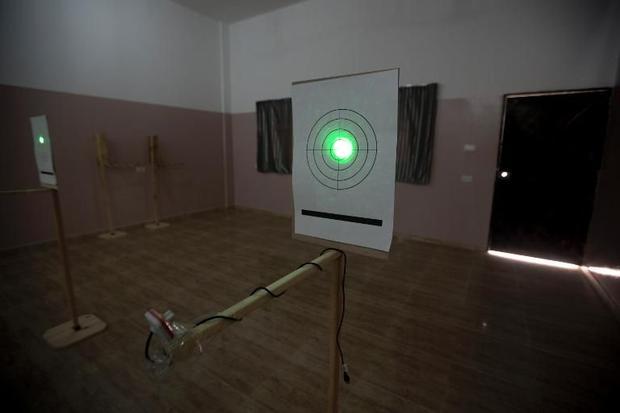Security forces in the Hamas-ruled Gaza Strip are using technology to practice shooting on laser simulators, saving money spent on ammunition in the cash-strapped Palestinian territory.
In a converted gym, four uniformed officers aim at targets with Kalashnikov assault rifles converted to fire beams of laser light, whose path is recorded on a computer in a control room and monitored by an instructor.
"Electronic shooting has great advantages," said Colonel Mohammed al-Nakhala, head of training in Gaza's National Security organisation.
"This is a leap forward in training provided by the interior ministry which saves a great deal of ammunition, money and work," he told AFP.
The ministry's training director, Mahmud Shubaki, says the simulators allow trainees to practise extensively before graduating to use of live fire.
"On a real shooting range we are limited by the number of rounds we can fire," he said.
Shubaki said four Kalashnikovs had been converted to fire electronically and fitted with an air-powered mechanism to simulate the recoil of shooting live rounds.
The 32-year-old Shubaki, who received military training in Algeria, said the new system had cut the cost of a firearms course from $20,000 to $1,000 (14,500 to 720 euros).
But trainee Omar al-Halabi, a 32-year-old lieutenant, said he prefers live fire exercises over the simulator which "feels like a video game".
Hamas, shunned as a terrorist movement by Israel, the United States and the European Union, seized control of Gaza from the rival Fatah after a week of fierce fighting in 2007 but is undergoing a worsening budget crisis.
The Strip's borders with Israel are tightly controlled by land sea and air, and passage across the frontier with neighbouring Egypt has been severely restricted since last July when its army deposed Hamas's ally, president Mohamed Morsi of the Muslim Brotherhood.
Last month a Cairo court barred the militant Islamic group from operating in Egypt and said it would seek to seize the movement's assets there.
After Morsi's overthrow, the army destroyed hundreds of smuggling tunnels under the border, reducing the flow of cash to Hamas coffers.
It is now struggling to pay the wages of 51,000 civil servants and budget cuts will no longer be able to spare the security services.
Hamas officials and security personnel, whose fuel bills were in the past paid in full by the government are now being asked to pay half from their own pockets, security sources say.
And police are moving over more and more to using motorcycles rather than cars because of constant fuel shortages.
The destroyed tunnels were widely used for the import of fuel, food, construction materials and military supplies.
Security forces in the Hamas-ruled Gaza Strip are using technology to practice shooting on laser simulators, saving money spent on ammunition in the cash-strapped Palestinian territory.
In a converted gym, four uniformed officers aim at targets with Kalashnikov assault rifles converted to fire beams of laser light, whose path is recorded on a computer in a control room and monitored by an instructor.
“Electronic shooting has great advantages,” said Colonel Mohammed al-Nakhala, head of training in Gaza’s National Security organisation.
“This is a leap forward in training provided by the interior ministry which saves a great deal of ammunition, money and work,” he told AFP.
The ministry’s training director, Mahmud Shubaki, says the simulators allow trainees to practise extensively before graduating to use of live fire.
“On a real shooting range we are limited by the number of rounds we can fire,” he said.
Shubaki said four Kalashnikovs had been converted to fire electronically and fitted with an air-powered mechanism to simulate the recoil of shooting live rounds.
The 32-year-old Shubaki, who received military training in Algeria, said the new system had cut the cost of a firearms course from $20,000 to $1,000 (14,500 to 720 euros).
But trainee Omar al-Halabi, a 32-year-old lieutenant, said he prefers live fire exercises over the simulator which “feels like a video game”.
Hamas, shunned as a terrorist movement by Israel, the United States and the European Union, seized control of Gaza from the rival Fatah after a week of fierce fighting in 2007 but is undergoing a worsening budget crisis.
The Strip’s borders with Israel are tightly controlled by land sea and air, and passage across the frontier with neighbouring Egypt has been severely restricted since last July when its army deposed Hamas’s ally, president Mohamed Morsi of the Muslim Brotherhood.
Last month a Cairo court barred the militant Islamic group from operating in Egypt and said it would seek to seize the movement’s assets there.
After Morsi’s overthrow, the army destroyed hundreds of smuggling tunnels under the border, reducing the flow of cash to Hamas coffers.
It is now struggling to pay the wages of 51,000 civil servants and budget cuts will no longer be able to spare the security services.
Hamas officials and security personnel, whose fuel bills were in the past paid in full by the government are now being asked to pay half from their own pockets, security sources say.
And police are moving over more and more to using motorcycles rather than cars because of constant fuel shortages.
The destroyed tunnels were widely used for the import of fuel, food, construction materials and military supplies.















